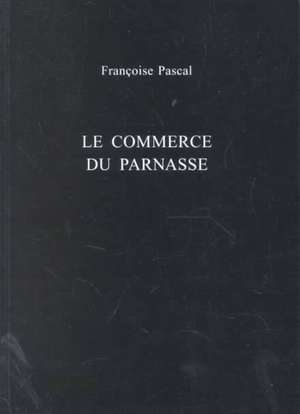Le Commerce du Parnasse: Exeter French Texts
Autor Françoise Pascal Editat de Deborah Steinbergeren Limba Engleză Paperback – 31 ian 2001
This critical edition of Françoise Pascal’s epistolary collection Le Commerce du Parnasse (Paris, 1669) highlights a rare, innovative and entertaining work by a woman writer virtually unknown today, but in her time a distinguished playwright, poet and painter.
Composed of thirty-seven letters in prose and verse, Le Commerce du Parnasse is part gallant correspondence, part poetry collection, part epistolary novel. Now in its first modern edition, this fascinating text provides new insights into seventeenth-century salon life and the discourses of galanterie and préciosité.
This is a volume in the series Textes littéraires/Exeter French Texts. The text, intorudction and essential notes are all in French.
Din seria Exeter French Texts
-
 Preț: 233.88 lei
Preț: 233.88 lei -
 Preț: 230.79 lei
Preț: 230.79 lei -
 Preț: 341.07 lei
Preț: 341.07 lei -
 Preț: 195.85 lei
Preț: 195.85 lei -
 Preț: 230.79 lei
Preț: 230.79 lei -
 Preț: 228.88 lei
Preț: 228.88 lei -
 Preț: 286.17 lei
Preț: 286.17 lei -
 Preț: 150.80 lei
Preț: 150.80 lei -
 Preț: 151.05 lei
Preț: 151.05 lei -
 Preț: 149.91 lei
Preț: 149.91 lei -
 Preț: 150.60 lei
Preț: 150.60 lei -
 Preț: 150.58 lei
Preț: 150.58 lei -
 Preț: 150.52 lei
Preț: 150.52 lei -
 Preț: 149.54 lei
Preț: 149.54 lei -
 Preț: 150.00 lei
Preț: 150.00 lei -
 Preț: 150.52 lei
Preț: 150.52 lei -
 Preț: 150.26 lei
Preț: 150.26 lei -
 Preț: 150.00 lei
Preț: 150.00 lei -
 Preț: 151.68 lei
Preț: 151.68 lei -
 Preț: 149.79 lei
Preț: 149.79 lei -
 Preț: 149.19 lei
Preț: 149.19 lei -
 Preț: 151.52 lei
Preț: 151.52 lei -
 Preț: 150.58 lei
Preț: 150.58 lei -
 Preț: 153.29 lei
Preț: 153.29 lei -
 Preț: 150.79 lei
Preț: 150.79 lei -
 Preț: 150.36 lei
Preț: 150.36 lei -
 Preț: 151.53 lei
Preț: 151.53 lei -
 Preț: 150.57 lei
Preț: 150.57 lei -
 Preț: 148.75 lei
Preț: 148.75 lei -
 Preț: 149.35 lei
Preț: 149.35 lei -
 Preț: 149.54 lei
Preț: 149.54 lei
Preț: 285.18 lei
Nou
Puncte Express: 428
Preț estimativ în valută:
54.59€ • 59.31$ • 45.88£
54.59€ • 59.31$ • 45.88£
Carte tipărită la comandă
Livrare economică 21 aprilie-05 mai
Preluare comenzi: 021 569.72.76
Specificații
ISBN-13: 9780859896672
ISBN-10: 0859896676
Pagini: 49
Dimensiuni: 201 x 147 x 18 mm
Greutate: 0.11 kg
Editura: UNIVERSITY OF EXETER PRESS
Colecția University of Exeter Press
Seria Exeter French Texts
Locul publicării:United Kingdom
ISBN-10: 0859896676
Pagini: 49
Dimensiuni: 201 x 147 x 18 mm
Greutate: 0.11 kg
Editura: UNIVERSITY OF EXETER PRESS
Colecția University of Exeter Press
Seria Exeter French Texts
Locul publicării:United Kingdom
Notă biografică
Deborah Steinberger is Assistant Professor of French and Comparative Literature at the University of Delaware.
Recenzii
“This collection of letters (apparently a genuine correspondence) between Françoise Pascal and various acquaintances provides what is no doubt a faithful reflection of the tone of conversation and poetry produced in salon groups during the second half of the seventeenth century . . . the work takes a while to get into, but it amply repays the reader’s attention . . . The useful introduction gives biographical information about Françoise Pascal, explains what is historically significant about this collection, and pinpoints the feminist component of her thought.” –Papers on French Seventeenth Century Literature, Vol. 29, No. 56, 2002
















